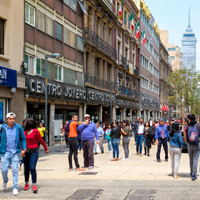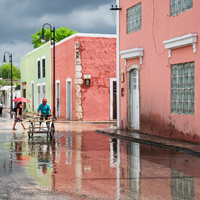Moving to Ixtapa, Mexico
Last updated on Mar 04, 2025
Summary: Moving to Ixtapa, Mexico: Expats, retirees and digital nomads talk about everything you need to know before moving to Ixtapa.
What do I need to know before moving to Ixtapa?
When we asked people what advice they would give someone preparing to move to Ixtapa, they said:
"Before moving to Ixtapa, expats should know that the official language is Spanish, so learning the language will be beneficial. The cost of living is generally lower than in many Western countries, but it can vary depending on lifestyle choices. Healthcare in Ixtapa is of a good standard, with both public and private options available. Expats should be aware that Ixtapa has a tropical climate, with a wet season from May to October and a dry season from November to April. The city is known for its beautiful beaches and outdoor activities, so it's perfect for those who love nature and water sports. It's important to understand the local customs and traditions to integrate into the community. Mexican culture is very family-oriented and social, with a strong emphasis on respect for elders. Expats should also be aware of the visa requirements for living in Mexico. A temporary resident visa is typically required for those planning to stay more than six months. Safety can be a concern in certain parts of Mexico, but Ixtapa is generally considered safe for expats. However, it's always important to stay vigilant and take common-sense precautions. Finally, expats should know that the infrastructure in Ixtapa may not be as developed as in their home country. Internet service, for example, may not be as reliable. It's also worth noting that while Ixtapa is a popular tourist destination, English is not widely spoken outside of the tourist areas," replied a member in Ixtapa.
How do I find a place to live in Ixtapa?
We asked expats how they chose their neighborhood and found a place to live. They answered:
"Finding a place to live in Ixtapa, involves several steps. First, you need to determine your budget and the type of accommodation you're looking for. This could range from a small apartment to a large villa. Next, you should research the different neighborhoods in Ixtapa to find one that suits your lifestyle and preferences. Some people might prefer a quiet, residential area, while others might want to be closer to the beach or the city center. Once you have a clear idea of what you're looking for, you can start your search. There are several online platforms where you can find listings for rentals or properties for sale in Ixtapa, such as Zillow, Airbnb, and Vrbo. You can also contact real estate agencies in Ixtapa. They can provide you with listings that match your criteria and arrange viewings. Some well-known agencies in the area include Remax and Century 21. Another option is to visit Ixtapa and look for "for rent" or "for sale" signs. This can be a good way to find properties that aren't listed online. Once you've found a place you're interested in, you should arrange a viewing. This will give you a chance to see the property in person and ask any questions you might have. If you decide to proceed with a rental or purchase, you'll need to negotiate the terms and sign a contract. It's recommended to hire a lawyer to help with this process, especially if you're not fluent in Spanish. Finally, once the contract is signed, you can move into your new home in Ixtapa. Remember to set up utilities and internet, and familiarize yourself with the local area," said one expat in Ixtapa.

Welcome Home Mexico occupies a niche in the market as a successful relocation and real estate firm helping expats moving to Mexico! As seen on CBS news, PBS, in the L.A. Times and more, we are one of the leading companies in this field. Welcome Home Mexico offers a wide range of services, multi-lingual knowledgeable brokers with experience, efficient and professional service.
Click connect to have our partner contact you via e-mail and/or phone.

Welcome Home Mexico occupies a niche in the market as a successful relocation and real estate firm helping expats moving to Mexico! As seen on CBS news, PBS, in the L.A. Times and more, we are one of the leading companies in this field. Welcome Home Mexico offers a wide range of services, multi-lingual knowledgeable brokers with experience, efficient and professional service.
Click connect to have our partner contact you via e-mail and/or phone.
What is a typical expat home or apartment like in Ixtapa?
"A typical expat home or apartment in Ixtapa, is often a spacious, modern dwelling with a blend of traditional Mexican and contemporary design elements. These homes usually have multiple bedrooms and bathrooms, a fully equipped kitchen, and a large living area. Many of these homes also feature outdoor spaces such as balconies or patios, often with stunning views of the surrounding natural beauty, including the ocean, mountains, or lush tropical gardens. Some homes may also have private pools or access to shared community amenities like a swimming pool, fitness center, or tennis courts. The homes are often located within gated communities, providing an added layer of security. They are typically furnished, with comfortable, high-quality furniture and modern appliances. Many expat homes in Ixtapa also feature air conditioning, given the region's warm climate. The homes are often brightly colored, reflecting the vibrant local culture, and may feature local artwork or crafts," said one expat in Ixtapa.
What is the average cost of housing in Ixtapa?
If you are thinking about moving to Ixtapa, cost of living in probably a key consideration. Expats commented about the cost of housing:
"The average cost of housing in Ixtapa can vary greatly depending on the type and location of the property. For instance, a luxury beachfront condo can cost significantly more than a small apartment in the city center. However, on average, you can expect to pay a moderate amount for a decent house or apartment in Ixtapa. It's worth noting that property prices in Ixtapa are generally lower than in many other popular tourist destinations in Mexico," remarked one expat who made the move to Ixtapa.
Should I buy or rent a home in Ixtapa?
If you have not spent a lot of time in Ixtapa, you should rent before even thinking about buying. We asked expats there about the buy vs. rent decision:
"The decision to buy or rent a home in Ixtapa, largely depends on your personal circumstances, financial situation, and long-term plans. If you plan to stay in Ixtapa for a long period or frequently visit, buying a home could be a good investment. Owning a property allows you to build equity over time and could provide rental income if you choose to rent it out when you're not there. On the other hand, renting a home in Ixtapa offers more flexibility. It's a good option if you're not sure how long you'll be staying or if you prefer not to have the responsibilities of home ownership. Renting can also be more affordable in the short term, as it doesn't require a large down payment or additional costs like property taxes and maintenance. It's also important to consider the real estate market in Ixtapa. If property values are rising, buying a home could be a good investment. However, if the market is unstable or property values are declining, renting might be a safer option. Lastly, consider your financial situation. Buying a home is a significant financial commitment and typically requires a stable income and good credit. If you're not in a position to make such a commitment, renting might be the better choice. In conclusion, both buying and renting a home in Ixtapa have their advantages and disadvantages. It's important to carefully consider your personal circumstances, financial situation, and long-term plans before making a decision," remarked one expat who made the move to Ixtapa.
What should I pack when moving to Ixtapa?
We asked people living in Ixtapa to list three things they wish they had brought and three they wish they had left behind. They responded:
"When moving to Ixtapa, you should pack lightweight clothing due to the tropical climate, including shorts, t-shirts, and swimwear. Don't forget to pack a hat, sunglasses, and sunscreen to protect yourself from the sun. It's also a good idea to bring a light jacket or sweater for cooler evenings. Pack comfortable walking shoes, as well as sandals or flip-flops for the beach. If you plan on dining in upscale restaurants or attending formal events, pack some dressier outfits as well. Remember to bring all necessary travel documents, such as your passport, visa, and driver's license. If you take prescription medication, bring enough to last for your entire stay, along with a copy of your prescription. Pack toiletries, but keep in mind that most items can be purchased locally. If you use specific brands, however, you may want to bring them with you. Don't forget to pack electronics like your phone, laptop, and camera, along with their chargers. A power adapter may also be necessary if your devices don't match Mexico's power outlets. Lastly, pack a Spanish-English dictionary or phrasebook, as not everyone in Ixtapa may speak English. It could also be helpful to download a translation app on your phone," explained one expat living in Ixtapa, Mexico.
 Dream Pro Homes Luxury
Dream Pro Homes LuxuryConnect
Dream Pro Homes Luxury owner Greg Gunter is the Broker for Berkshire Hathaway HomeServices offering luxury home options in the UNESCO city of San Miguel de Allende, Mexico, rated the No. 1 City in the World five years running from Conde Nast Traveler and Travel & Leisure magazines.
Click connect to have our partner contact you via e-mail and/or phone.
 Dream Pro Homes Luxury
Dream Pro Homes LuxuryDream Pro Homes Luxury owner Greg Gunter is the Broker for Berkshire Hathaway HomeServices offering luxury home options in the UNESCO city of San Miguel de Allende, Mexico, rated the No. 1 City in the World five years running from Conde Nast Traveler and Travel & Leisure magazines.
Connect
Click connect to have our partner contact you via e-mail and/or phone.
What cultural faux pas should I try to avoid making in Ixtapa?
We asked people in Ixtapa if they could share any humorous cultural blunders they commited. For new expats, keep in mind that these incidents are an inevitable part of expat life. Learning to laugh about them is the key!:
"When visiting Ixtapa, it's important to respect the local customs and traditions. Avoid making negative comments about the country or its people, as this is considered disrespectful. Do not assume everyone speaks English. While many people in tourist areas do speak English, it's polite to at least attempt to speak Spanish, even if it's just a few basic phrases. Avoid discussing controversial topics such as politics and religion. These subjects can be sensitive and it's best to steer clear of them unless you know the person well. Do not wear revealing clothing, especially in religious sites or more conservative areas. Mexicans tend to dress modestly, and showing too much skin can be seen as disrespectful. Avoid being loud or obnoxious in public places. Mexicans value politeness and being considerate of others. Do not litter. Mexicans take pride in their beautiful country and it's important to keep it clean. Avoid being overly affectionate in public. While it's common for friends to greet each other with a hug or a kiss on the cheek, public displays of affection beyond this can be seen as inappropriate. Do not arrive on time for social events. It's customary in Mexico to arrive 15 to 30 minutes late for social gatherings. Avoid refusing food or drink when offered. It's considered polite to accept, even if you're not hungry or thirsty. Do not leave a tip of less than 10-15% at restaurants. Tipping is customary in Mexico and it's considered rude not to leave a tip. Finally, do not assume that bargaining is always acceptable. While it's common in some markets, it's not appropriate in all situations," commented one expat who made the move to Ixtapa.
About the Author
 Joshua Wood, LPC is one of the Founders of Digital Nomad Exchange and serves as Co-President of Expat Exchange. Prior to Expat Exchange and Digital Nomad Exchange, Joshua worked for NBC Cable (MSNBC and CNBC
Primetime). Joshua has a BA from Syracuse and a Master's in Clinical and Counseling Psychology from Fairleigh Dickinson University. Mr. Wood is also a licensed counselor and psychotherapist.
Joshua Wood, LPC is one of the Founders of Digital Nomad Exchange and serves as Co-President of Expat Exchange. Prior to Expat Exchange and Digital Nomad Exchange, Joshua worked for NBC Cable (MSNBC and CNBC
Primetime). Joshua has a BA from Syracuse and a Master's in Clinical and Counseling Psychology from Fairleigh Dickinson University. Mr. Wood is also a licensed counselor and psychotherapist.
Some of Joshua's articles include Pros and Cons of Living in Portugal, 10 Best Places to Live in Ireland and Pros and Cons of Living in Uruguay. Connect with Joshua on LinkedIn.

Welcome Home Mexico helps you find the perfect home in Mexico.
Learn More
![]() Mexico Forum
Mexico Forum
Talk with other digital nomads and expats in Mexico on our Mexico forum - meet people, get advice and help others.
![]() Contribute
Contribute
Help others in Mexico by answering questions about the challenges and adventures of living in Mexico.
Digital Nomads in Mexico offer advice about healthcare, hospital visits, emergency rooms visits, finding a doctor and buying health insurance in Mexico.



